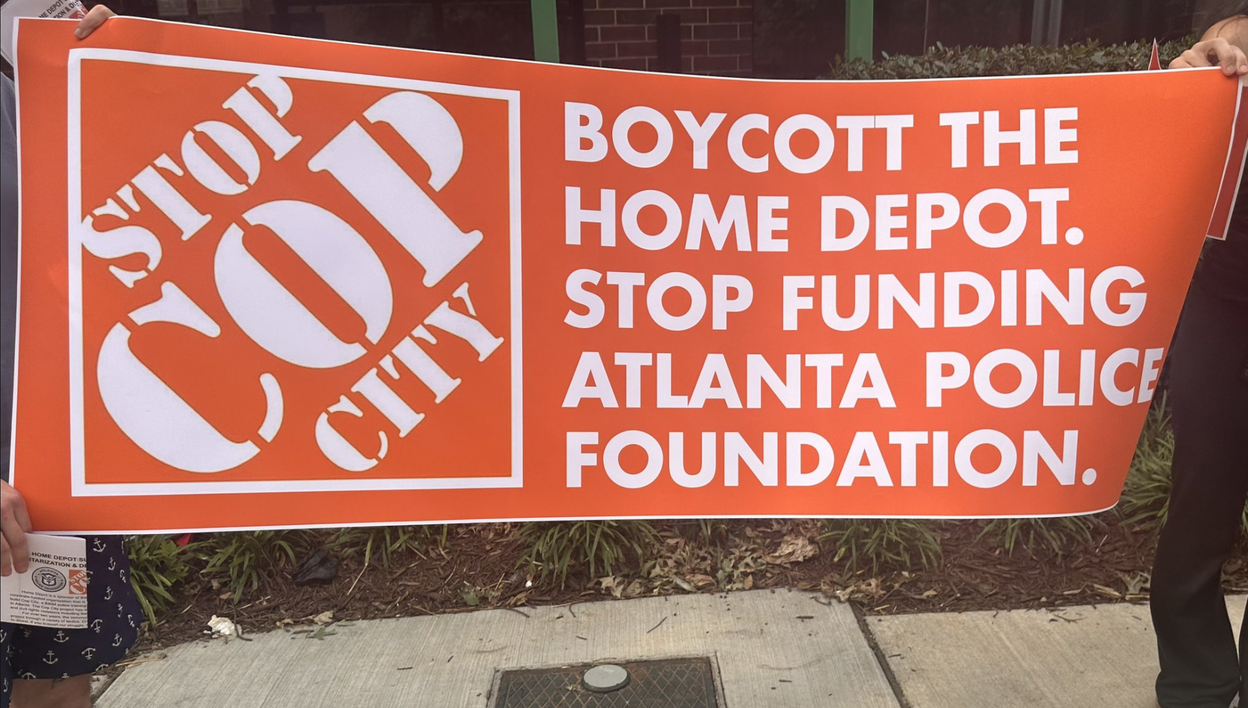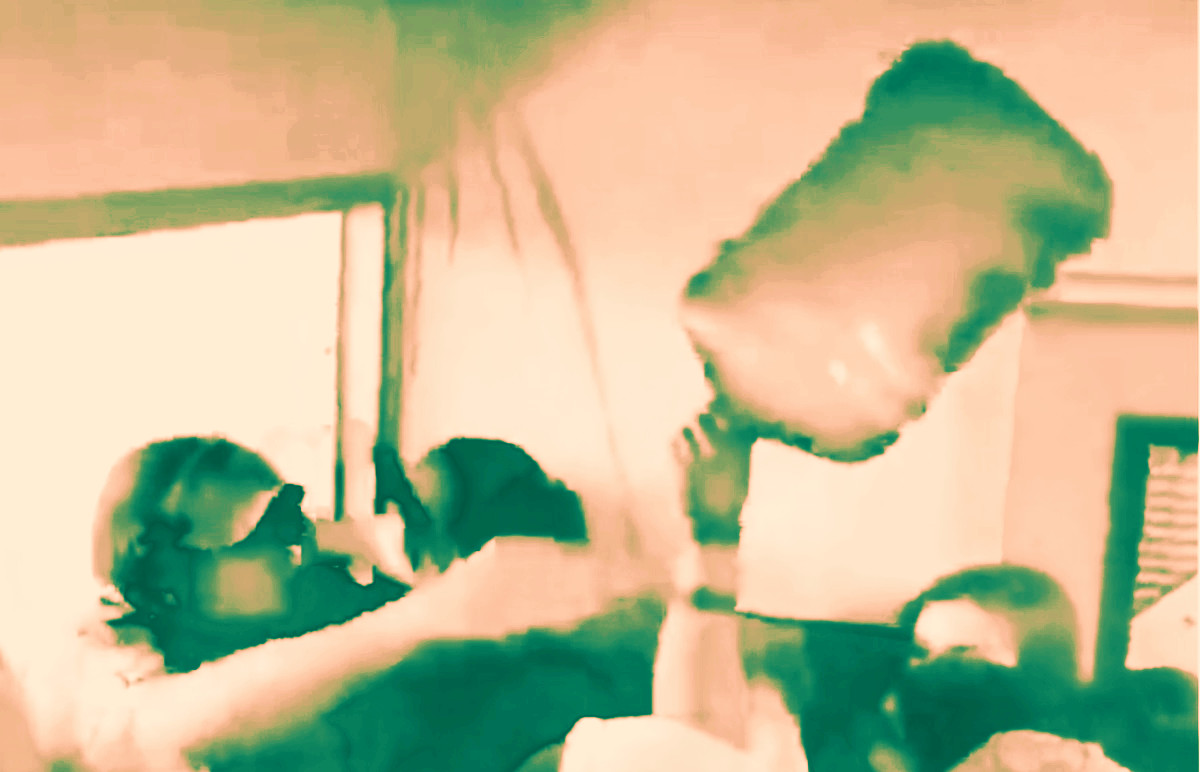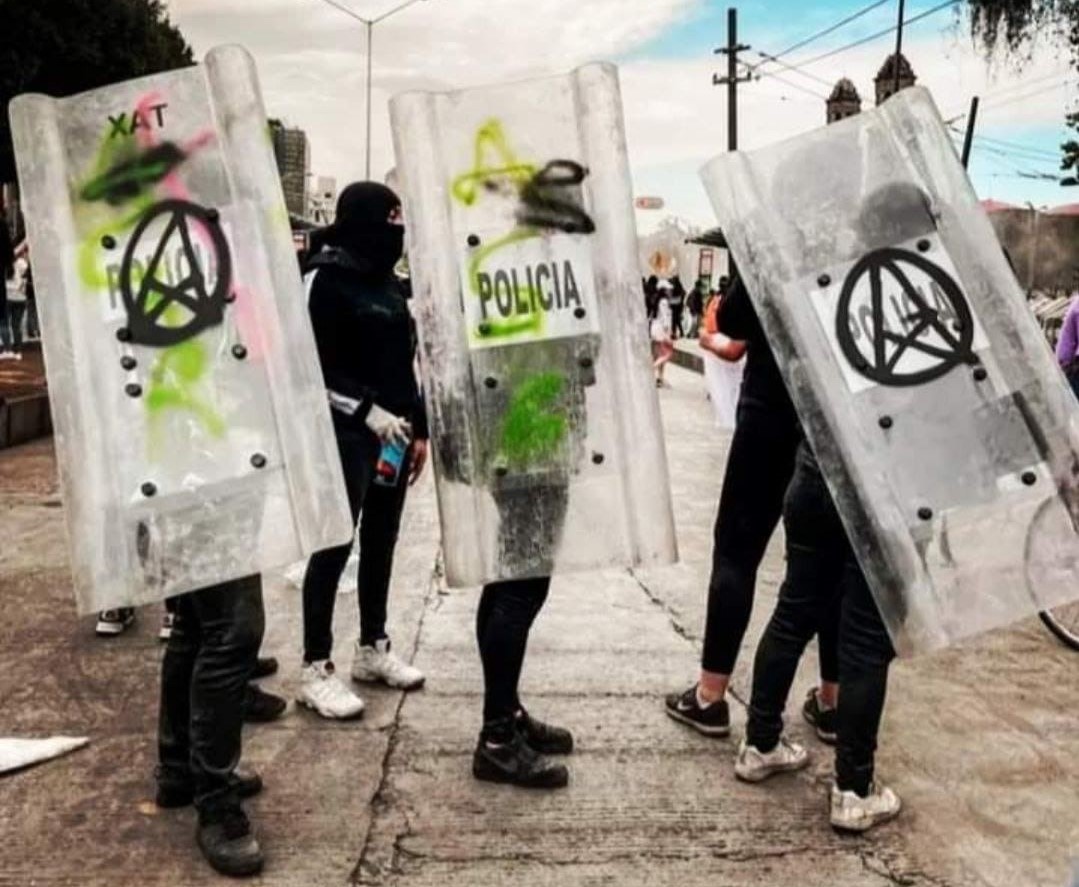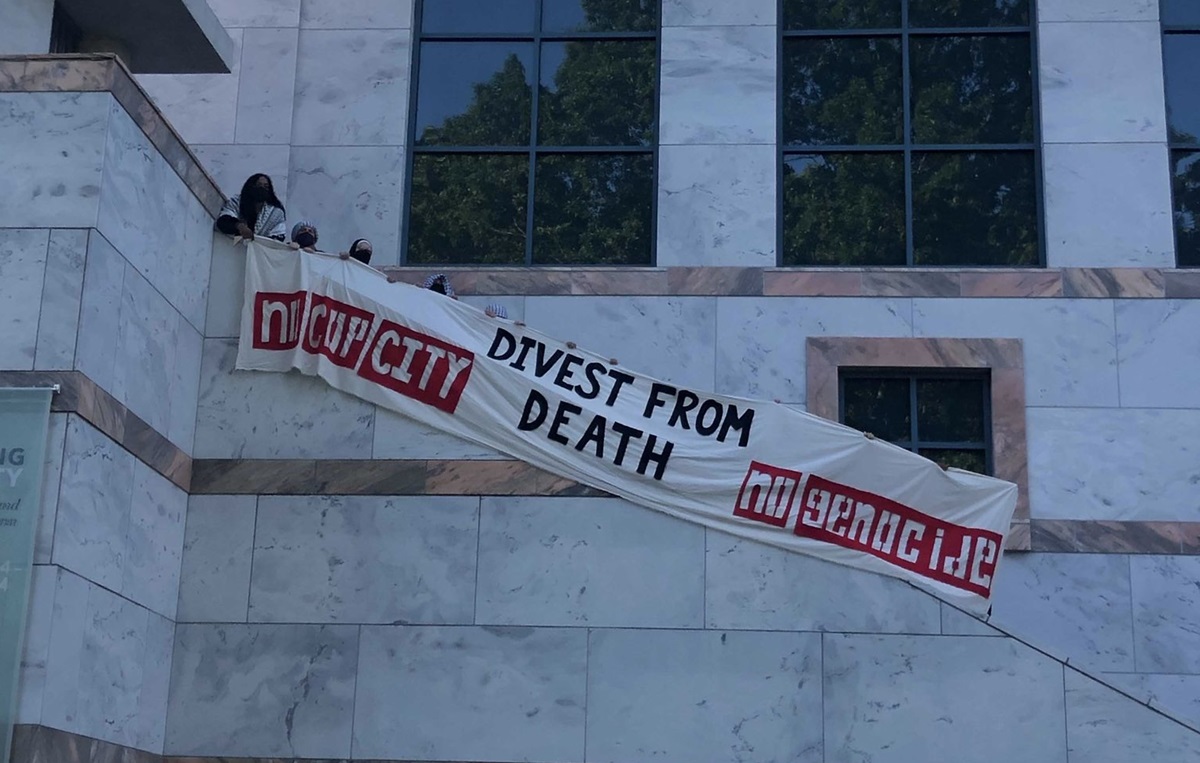Filed under: Action, Anarchist Movement, Environment, Land, Southeast

What follows is the fifth and sixth report in a series of daily dispatches from a comrade who is attending the Weelaunee Summer Week of Action (June 24-July 1) in Atlanta, Georgia. Originally posted to Living and Fighting.
The march begins at Gresham Park, a DeKalb County Park within walking distance of the Weelaunee Forest. People start to trickle in shortly before 6 p.m., coming together collectively to demand the reopening of Weelaunee. Nervousness and anticipation abound, and quiet conversations speculate on what will unfold. Will the police attempt to attack the march? They arrested one person and detained another over relatively little just this morning, so it seems likely. On the other hand, will collective power accumulate here such that we’ll be able to march straight into the forest itself? After all, what the movement has desired above all else this week is to return home to Weelaunee. Beneath a ramada next to where we gather, a birthday party carries on unbothered by our trepidation. Friends and family soak each other with water guns, and share food and drinks in the Georgia summer sun.
As I wait, my own uncertainties gnawing at my stomach, I see two white-tail deer—a buck and a doe—passing along the periphery of the park. I think of home and of one of my closest friends, for whom the mule deer of their ancestral homeland in the Southwest hold a place of deep spiritual and cultural importance. I think of our long desert hikes together where we’d see deer and they’d say with a smile that their relatives had come to check on us. I wish I could call them. A police helicopter circles overhead and I’m told to be mindful of an unmarked car spotted in the area. My thoughts drift to the scale and stakes of this struggle, that the outcome of this moment in space and time will determine the trajectory of policing everywhere for the decades to come. Cop City in Atlanta would mean police terror in the borderlands. The deer disappear into the woods.
The mobile altar for Tortuguita arrives and, quickly after, the march begins. Around 200 people converge and walk together up the bike path toward Intrenchment Creek Park. Music and chanting ring in the air. Some dance as they go, others hold hands, but everyone holds Weelaunee in their hearts.
“Tortuguita vive! La lucha sigue!”
As the march continues, my anxieties fall away and build into confidence. This is a movement of remembering how to move together, remembering how powerful it is and has been. This is a movement gliding across the shores of struggle, holding tightly to one another as the kinetic energy of the tremendous wave we created disperses. As we march, we are trying to pull each other back toward the ocean from which we derive our strength, growing toward the next wave. We feel so strained right now. There is so much uncertainty about what might happen, about what is truly possible in this moment. We feel vulnerable because of how spread out we are along this shore, but this is still the same water that crested with such terrifying beauty only a few months ago; this is only the rhythm of water.
The march stops along the bike path some distance from the tunnel that would bring us back home. Two police cruisers idle a few hundred feet away. Beyond them, a bend before the tunnel. Past that, Weelaunee. But it isn’t time yet, the circumstances aren’t correct. The energy and numbers aren’t there to handle a possible confrontation on the way in. So, just outside the forest’s front door, we share in collective mourning once again. I look upon the same mobile altar that was present Saturday night. Again, Tortuguita’s mother, Belkis Terán, speaks about her child and the legacy and struggle that we’ve inherited. I can still smell on my skin the rose tincture she’d given me, and others, before the march. After her, another person—anonymous in a mask and gloves—speaks of the necessity of struggle, of risk, of eschewing the illusion of safety. But, the speaker continues, the acceptance of risk and the willingness to act does not mean that we have a death-drive, a desire for martyrdom. It means choosing when we fight, when we attack, and “abandoning the idea of looking good losing.”
“We are not willing to sacrifice ourselves.”
And so we walk back together toward Gresham Park. The time to reoccupy Weelaunee was not today, but that does not mean that day won’t come. As we walk, we remember how to move together and the strength we carry together: a movement after the crest and into the next wave.
This is the sixth entry in a series of daily dispatches from a comrade who is attending the Weelaunee Summer Week of Action (June 24-July 1) in Atlanta, Georgia:
This week of action has been defined by a move away from the woods and into the terrain of the city. There have always been events outside of the forest–whether social gatherings or targeted attacks–but the beating heart of the movement was previously grounded in Intrenchment Creek Park and its surrounding areas. Now, with the movement exiled from the place it calls home, the pivot to the broader urban area comes as a strategic and, frankly, mandatory maneuver. Without the capacity to block destruction of Weelaunee with our physical presence, a higher emphasis has been placed on attacking forest-destroyers through more indirect avenues: pressure campaigns on insurers, targeting the business interests of funders, and confronting the politicians backing the cop city project.
That’s how, on the sixth day of the sixth week of action, we found ourselves at the Home Depot, a major donor to the Atlanta Police Foundation.
We arrived at the protest only ten minutes after the 5:00 p.m. start time listed on the flyer. By the ephemeral metric of “anarchy time,” we were perfectly punctual, perhaps even early. But we had already sensed that something was off while on our way: two helicopters hung in the air against the haze of the afternoon sky and circled the area where we were headed. Turning into the strip mall parking lot, we found police cruisers parked seemingly every five or six spaces. A weight of uncertainty fell over us but, figuring that we probably passed as normal trustworthy people, we parked and started walking the rest of the way to Home Depot. Unfortunately, our assumption about our appearance was quickly proven false when a private security team zipped up to us in a golf cart, vigorously demanding that we leave the area.
Circling back to the main road, we found the demonstrators lined up along the sidewalk. We learned that just before we arrived, police had arrested two people, one of whom was movement elder Lorraine Fontana.
The Home Depot was locked down and closed, as was the Starbucks that the demo stood in front of. The two helicopters we saw earlier hung overhead, now accompanied by a drone. Alongside police cruisers were additional unmarked cars, private security guards in a pickup truck, and the aforementioned golf cart team that had picked us out as troublemakers minutes before.
The scale of police presence in the space, and how clumsy their execution had been,seemed comical. It seemed unlikely that three sets of aerial surveillance were going to provide any additional information about a stationary group of fifty or so. It also seemed to defeat the purpose to paint each unmarked car the same highly recognizable shade of blue and to park them right next to marked cars. In any case, it was both revealing and a touch pathetic when an officer got on a loudspeaker and argued that he was, in fact, not an idiot.
The Weelaunee Coalition youth rally is kicking off in Brownwood Park. A little over 100 people are gathered. Belkis Terán is addressing the crowd, saying she is amazed by the movement and heartened when people tell her stories of her child, Manuel “tortuguita” Paez Terán pic.twitter.com/aT5EZuMseT
— Atlanta Community Press Collective (@atlanta_press) July 1, 2023
Despite every attempt at intimidation, the demonstration went on unabated. Chants were shared between short speeches. Most were from the usual Stop Cop City movement repertoire, while a few were specific to the campaign to boycott Home Depot:
“Stop! Don’t shop! No money for cops!”
Drums pounded rhythmically while people took turns leading chants. Flyers contextualizing the call to boycott Home Depot were distributed to passers-by. Every so often, a motorist would honk in support,and at least two city buses did so as well.
Besides the attempted show of force, very little occurred in terms of direct confrontation after the initial arrests. The only departure from this was when private security officers aggressively approached one protester standing separate from the group. Focus quickly turned toward the officers with chants of, “Cops, pigs, murderers!” forcing the security guards back to their vehicles, one of them visibly shaking his head.
After that, the action carried on and wound down without much event. That night, a vigil was held for the two arrestees and, the following day, they were released into the loving arms of their community.




